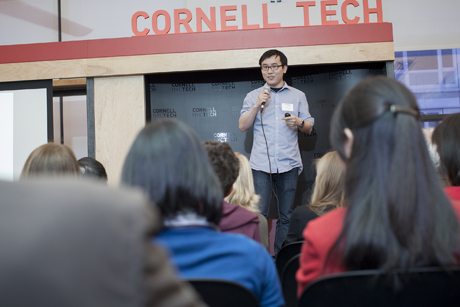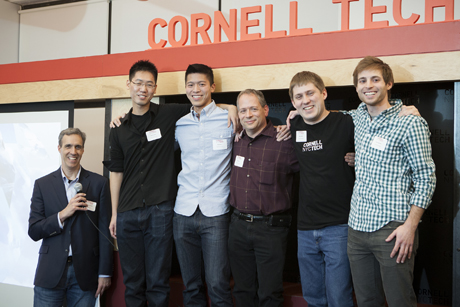Cornell Tech students show off their innovations
By Sylvia Harvey


In its quest to foster a culture of innovation and to blend fundamental academic work and practical applied work with an eye on the future of business, technology and entrepreneurship, Cornell Tech hosted its second “open studio” Dec. 13. It also showcased projects from its first graduating class and from new students in the program.
About 100 guests, including mentors, collaborators and industry affiliates attended the event at the Google building in Chelsea, where Cornell Tech is occupying donated space until its permanent home on Roosevelt Island is built.
“Open studio is a very important part of the way we are reimagining graduate tech education,” said Cornell Tech Dean Dan Huttenlocher. It’s a space to discuss and celebrate accomplishments and share work from the semester, he said. This open studio featured work from about 20 graduate students, including Cornell Tech’s first five-member graduating class of computer science Master of Engineering students.
Traditional university thinking is that “you work really hard to get the problem set or that project done, and once you’ve completed it you never want to see it again,” said Huttenlocher. Instead, he wants students “to think about their work as more of a portfolio that they’re sharing with others.”
Students recapped semesterlong, company-hosted projects and showcased their own startup projects – work they will carry with them beyond academia.
For example, students Andrew Li, David Jiang and Ted Krum presented their project, Motovatr, a platform for personal fitness activity-tracking applications that fosters commitment by rewarding activity with personalized games and visual feedback. They’re reimagining the app for mobile and tech-savvy consumers who struggle with fitness goals. Many fitness apps are demotivating, much like little people in your pocket harassing you about how lazy you are, the team joked.
Erich Graham and Greg Tobkin showcased Doctible, an online service that brings price transparency to health care by crowdsourcing out-of-pocket doctor costs from patient reports to help prospective patients price shop for medical treatments before they make an appointment.
Aditya Mukerjee, Kevin Luo and Yiqiu Huang presented their work with Google on extending the open-source IPython notebook project to create a platform for fully interactive digital textbooks. Saying goodbye to passive learning, they’re adding functionalities, such as Google Drive integration, a live commenting system, inline smart quizzes and other ways to improve interactive learning experiences for students.
Andrew Drozdov and Mor Cohen worked with Hearst Corp., using machine learning to predict how many page views an article will receive to assist editors in refining articles, while Kwadwo Nyarko and Robert Parks worked with Qualcomm to research computer vision algorithms for object detection on mobiles.
Other presentations included Chen Cao and Hongtao Cai’s Smart Name Engine with eBay, which helps sellers discover attractive names for their projects; Alex Wolff and Kiran Vajapey worked with Apio Systems to evaluate test data in automotive applications, and Lauren Talbot and Todd Kawakita joined Shapeways to develop a mobile app to sort 3-D-printed models using image processing.
After the presentations, guests wandered from poster to poster, asking questions and exploring students’ long list of work. Vajapey’s poster featured Track It, a phone productivity tracker that monitors your phone usage per application, such as Facebook or Gmail. It has usage notifications and rankings, and a user can classify level of productivity and designate a specific amount of time allowed.
Huttenlocher called the students “pioneers” for embarking on the journey with Cornell Tech and being at the center of innovation.
Leaving Cornell Tech is sad, admitted Li, who left his job developing software at a big bank to attend the program. “It was a fun ride being a part of the first class. … I’m excited to be going down the entrepreneurial track.”
Sylvia A. Harvey is a freelance writer in New York City.
Media Contact
Get Cornell news delivered right to your inbox.
Subscribe